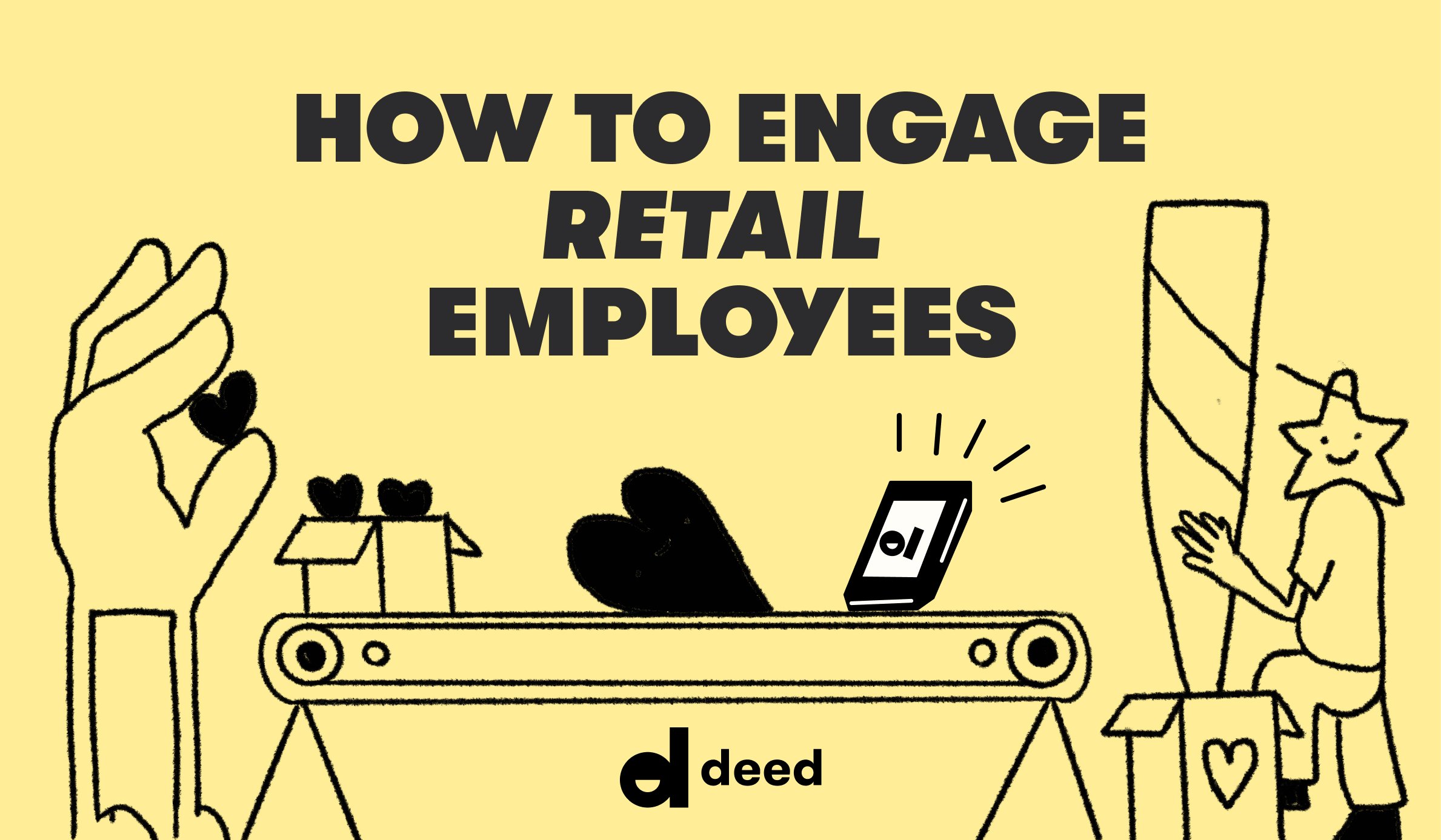How to Engage Retail Employees
Four ways to bring together non-desk workers from different shifts and store locations.
INTRODUCTION
At least eighty percent of the working population is comprised of “non-desk workers.” Those are the folks who organize product displays, help customers find items they’re looking for, check out shoppers at the register, and perform all sorts of other crucial functions for retail companies.
In the retail space, non-desk employees face unique challenges to feeling engaged in their work and connected to their company’s values. That’s especially true of companies with brick-and-mortar stores, whose employees are often paid on an hourly basis and cannot always take full advantage of great mission-driven programs like volunteerism and skill-sharing.
Our recent post ”How to Engage Non-Desk Employees” outlined a broad strategy including concrete tools that any company could incorporate to help their employees feel more eager to connect with their colleagues on and off the clock. That would be a good starting place for social impact teams still thinking through their engagement strategy.
Now, we want to highlight some challenges and opportunities involved in helping non-desk retail employees feel more fulfilled at work.
TWO MUST-HAVES WHEN ENGAGING RETAIL EMPLOYEES
- Company-wide communications platform (Mobile app, Slack, & Teams)
Most companies already use great work communications platforms like Slack and Microsoft Teams. Aside from being fun and familiar to most employees, these platforms can be integrated with other engagement initiatives, including your social impact and corporate social responsibility (CSR) programs.
If your non-desk employees are already on Slack or Teams, or if it’s not feasible to extend your account size to include them there, a dedicated mobile and desktop app can be an effective solution. The most inclusive apps streamline the registration process for non-desk employees. By providing a virtual hub where employees can share their thoughts, experiences, and passions directly with one another, you can help foster genuine community.
In fast-paced retail environments, nimble communications platforms can help employees feel more grounded and connected to your organization’s mission.
- Cross-departmental ERGs
Folks who may or may not normally work together are increasingly coming together to run volunteer events, invite speakers, organize fundraisers, and workshop company policies around shared passions under the guise of employee resource groups (ERGs). Ninety percent of Fortune 500s have had ERGs for more than five years, and their leadership has sparked momentum across markets and industries.
By putting people and the causes they care about first, ERGs offer a unique way for companies to make a greater social and environmental impact—especially at the local level. Whether they’re coming together in an environmentalism-focused ERG to identify opportunities for decarbonization, or celebrating the staff’s diversity of thought and identity, non-desk employees will take greater responsibility for the company’s mission and values by meeting regularly to do good deeds with their friends and colleagues.
While the appeal spans all generations, it's especially significant with Millennials and Gen Z. The Harvard Business Review reports that 72 percent of 18–24 year-olds are more likely to apply to work for companies with ERGs. Attracting, retaining, and encouraging the kinds of employees who will create that vibrant workplace culture we all crave is achievable if we can offer more opportunities to feel and do good at work.
FOUR WAYS TO ENGAGE RETAIL EMPLOYEES
- Clearly communicate your organization’s purpose
The fundamental ways in which a retail company’s products contribute to its broader vision of the world may be clear back at HQ, but it isn’t always obvious from the aisles or at the register. Posters and merchandise that communicate the company’s purpose do not tend to have as strong an impact as they’re meant to. Customers will always look to the employees themselves as ambassadors of purpose.
The most effective way to make your organization’s purpose known is to ensure it is a part of your employees’ day-to-day lives. They should learn from you how to look at volunteer events and disaster relief fundraisers not as distractions from their work, but extensions of it.
Our “Social Impact Storytelling” series breaks down best practices for communicating your organization’s purpose. The first installment looks at the qualities of a winning year-end impact report. It’s a great place to start if you’re trying to use your year-end report for more than just a roundup of what good you’ve done this year, but to fold it into the larger story of your organization’s purpose.
- Volunteer events after peak shopping seasons
Black Friday and the holidays, for example, are especially high-volume periods for retail employees. One way to show them you appreciate their hard work is to offer paid volunteer time off (VTO) for a company-wide event.
Volunteering is proven to positively impact mental, physical, and social health. This could also be a great way to give employees who work different shifts or even at different store locations the chance to connect that they might not otherwise have.
Sixty-three percent of employees want their employers to provide more opportunities for purpose in their day-to-day lives. With a well-deserved break spent doing good deeds in their local community, your employees will see firsthand how your organization tangibly benefits the lives of their friends and neighbors.
- Regularly ask for employee feedback
Not seeing the kind of engagement you’re looking for? It’s important to give retail employees frequent opportunities to provide honest feedback on all aspects of their work, including your social and environmental impact programs.
Deed’s survey tool gives program managers the ability to directly measure the efficacy of any volunteer event, fundraiser, or campaign. With a few clicks, you can send follow-up questionnaires out to all participants, get their thoughts, and democratize the way your organization decides on which initiatives to pursue.
If proactively soliciting feedback and incorporating it into your decision-making progress hasn’t been part of your process until now, that’s okay. But it’s important to note that feedback and engagement are directly linked, and the right social impact platform can help you with both at the same time.
- Empower employees to follow their passions on their own terms
Seasoned social impact leads know that no matter how hard they try to craft the perfect program, employees who don’t feel a strong connection to the events or their colleagues will not participate as much as they otherwise could.
But by centralizing your social and environmental programs on a single platform can help your retail employees know where, when, and how to get engaged.
With consistently engaging content on an accessible platform, companies can help retail workers build genuine connections with their friends and colleagues. A centralized hub can help associates to:
- Connect with a purpose-driven social network to share good deeds (e.g., volunteering events, fundraisers) with friends and colleagues
- Build interest-based communities that anyone can organize around ERGs, favorite causes, giving and volunteering habits, and more
- Access a personalized feed full of useful content, aggregated from all of the user’s communities
Read more about Deed’s Communities, which companies like Airbnb and lululemon are using to empower their employees to make a real difference on social and environmental causes.
THE BOTTOM LINE
Non-desk employees are vital links in the chain of any retail team. Companies that help their employees feel more fulfilled by their work life are seeing two-to-five times higher work and life outcomes by doubling down on purpose.
Deed is a platform designed to engage all of your employees—no matter where they work—by giving them ample opportunities to do good deeds with their colleagues and meaningfully support the social and environmental causes they care about.
We’re partnering with CSR champions like Airbnb and Ripple to revolutionize their teams’ engagement in social and environmental impact programs. Book a free demo today to learn how we can help all your employees feel more connected to your mission.


